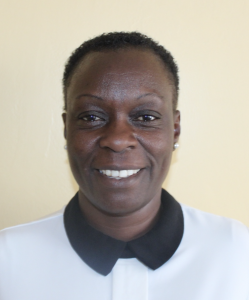Isulu Primary School is located in Bushimuli Village of Kakamega County, Kenya. It started in 1933 with just temporary structures made of iron sheets. Now, the school has grown to host 620 pupils! There is also an early education section that has 88 pupils. The school employs 12 teachers.
(Editor's Note: While this many people may have access on any given day, realistically a single water source can only support a population of 350-500 people. To learn more about how we determine the number of people served, click here.)
The headteacher told us that it's been a challenge for them to connect with parents, saying that the parents don't value education. Most of the parents are illiterate and have not attended any grades at all. This has actually made it difficult to appoint parents to be members of the board of management since it is required by law that for one to be a member, he or she must have at least passed the form four. Consequently, the school has appointed members who are not parents at the school. It doesn't even bother most parents when a pupil misses school.
A normal day starts very early for these students, as they're required to do a lot in preparation for school. To get through the school gate, students are required to carry not only their homework and books but a container of water too. They use this water to clean their classrooms and latrines, and the rest for cooking school lunch and drinking.
Water
There's a plastic tank that can collect rainwater, but it doesn't last long without being recharged. To supplement this low capacity, students are asked to carry water from home. There's no way for the administration to verify the safety of this water, but the illnesses that emerge as students drink this water points towards poor quality. There are several absences every week, with students reporting waterborne illnesses like typhoid.
Sanitation
There are several pit latrines for students, including ecosan latrines (the pits are actually bins that should be emptied when full). Around a dozen of these are functional, but are overused by too many students. The lines during break times are so long that students can't make it to their next class, let alone wait that long to find relief. There is only one spot to wash hands, so only a portion of these students have the opportunity to wash up before returning to class.
Here's what we're going to do about it:
Training
Training will be held for two days. The facilitator will use PHAST (participatory hygiene and sanitation transformation), ABCD (asset-based community development), CTC (child to child), lectures, group discussions, and handouts to teach health topics and ways to promote good practices within the school. The CTC method will prepare students to lead other students into healthy habits, as well as kickstart a CTC club for the school.
Handwashing Stations
This CTC club will oversee the new facilities, such as handwashing stations, and make sure they are kept clean and in working condition. The two handwashing stations will be delivered to the school, and the club will fill them with water on a daily basis and make sure there is always a cleaning agent such as soap or ash.
VIP Latrines
Two triple-door latrines will be constructed with local materials that the school will help gather. And with a new source of water on school grounds, students and staff should have enough to keep these new latrines clean.
Rainwater Catchment Tank
A 50,000-liter rainwater catchment tank will help alleviate the water crisis at this school. The school will also help gather the needed materials such as sand, rocks, and water from the spring for mixing cement. Once finished, this tank can begin catching rainfall that will be used by the school’s students and staff.
We and the school strongly believe that with this assistance, standards will significantly improve. These higher standards will translate to better academic performance!

 Rainwater Catchment
Rainwater Catchment
 Rehabilitation Project
Rehabilitation Project





































